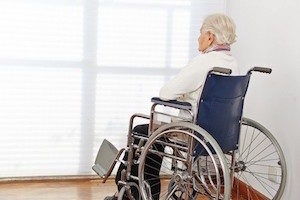Nursing Home Abuse
San Antonio, TX Nursing Home Abuse Lawyer
 We entrust nursing homes with our loved ones—particularly those who need 24-hour care. Yet more and more we hear stories of nursing home abuse and neglect, and alarming statistics about how frequently elderly residents are found with bed sores, or are found outside of their homes as a result of wandering.
We entrust nursing homes with our loved ones—particularly those who need 24-hour care. Yet more and more we hear stories of nursing home abuse and neglect, and alarming statistics about how frequently elderly residents are found with bed sores, or are found outside of their homes as a result of wandering.
State Standards
Texas requires that certain standards be met for the many assisted living facilities in the state. The goal of the Health and Safety Code is to ensure that institutions deliver the highest possible quality of care. State standards specifically address:
- Quality of life;
- Access to care;
- Continuity of care;
- Comprehensiveness of care;
- Coordination of services;
- Humaneness of treatment;
- Conservatism in intervention;
- Safety of the environment;
- Professionalism of caregivers; and
- Participation in useful studies. (Sec 242.001).
State rules and standards guide licensed institutions, and the Texas state legislature declared that these institutions be regulated such that residents receive the highest level of protection by:
- Providing the highest possible quality of care;
- Monitoring all factors related to the health, safety, welfare, and dignity of each resident;
- Imposing prompt and effective remedies for noncompliance; and
- Providing the public with information concerning the operations of these state institutions.
Resident’s Rights
Texas law also puts forth a statement of residents’ rights. Specifically, a resident has the constitutional, civil, and legal right to:
- Be free from abuse and exploitation
- Safe, decent, and clean conditions
- Be treated with courtesy and respect
- Be free from discrimination based on age, race, religion, sex, nationality, or disability
- Practice their own religious beliefs
- Have an electronic monitoring device in their room
- Privacy, including during visits and telephone calls
- Complain about the institution and participate in a program where concerned are voiced to the institution’s administrator
- Have their information kept confidential
- Retain a physician of their own choosing
- Participate in developing a plan of care
- Refuse treatment and/or participation in experimental research
- Receive a written statement or agreement concerning the services provided by the institution and related charges
- Manage their own finances or delegate that responsibility to someone else
- Access their own money and property, an accounting of their deposits with the institution
- Keep and use personal property, secure from theft or loss
- Not be relocated within the institution
- Receive visitors
- Receive unopened mail and any needed assistance in reading or writing correspondence
- Participate in activities inside and outside the institution
- Wear their own clothes
- Discharge themselves from the institution (unless adjudicated mentally incompetent)
- Not be discharged from the institution except as provided by specific standards (sec. 403)
- Be free from any physical or chemical restraints; and
- Receive information about prescribed psychoactive medication and to refuse to consent to the prescription of psychoactive medications.
Signs of Nursing Home Abuse or Neglect
While neglect describes failing to do something that is necessary to help care for a resident, abuse describes an intentional action to hurt a resident (physically, emotionally, and/or financially). There are some signs of abuse or neglect that are important to watch out for, including but not limited to:
- Bed sores/Pressure Ulcers (sores that develop when a person is in one position for too long, without a minimum amount of movement)
- Losing weight
- Very fearful around nursing home staff
- The presence of bruises or other marks
- Neglected medical issues
- Unreasonable seclusion
- Dehydration or malnutrition
- Signs of sexual abuse
- Unexplained broken bones or other injuries
- The presence of infections
Click for infographic:
Enforcement
The Office of the Attorney General of Texas works with the Texas Department of Aging and Disability Services (TDADS) to protect nursing home residents in long-term care facilities and ensure that they are not subject to abuse, neglect, and exploitation. TDADS also runs a hotline to facilitate the reporting to abuse or neglect: 1-800-458-9858.
Let Us Help
Neglect and abuse does not necessarily have to be physical—it can be emotional as well. Financial exploitation also sometimes happens in nursing homes, where someone compromises a resident’s financial information, identity, or credit.
If you suspect that a loved one is being abused or neglected in a San Antonio nursing home, we can help to ensure that a thorough investigation is made and your rights (and the rights of your loved ones) are protected. The Law Office of Ronald A. Ramos has extensive experience with abuse and neglect cases. We know how to put together a case to achieve justice for your loved ones. Contact our office today for a free consultation.
Law Offices of Ronald A. Ramos, P.C.
1844 Lockhill Selma Rd #102
San Antonio, TX 78213
Phone: (210) 308-8811
Email: info@sanantonioaccidentlawyer.com
Contact Us Today


